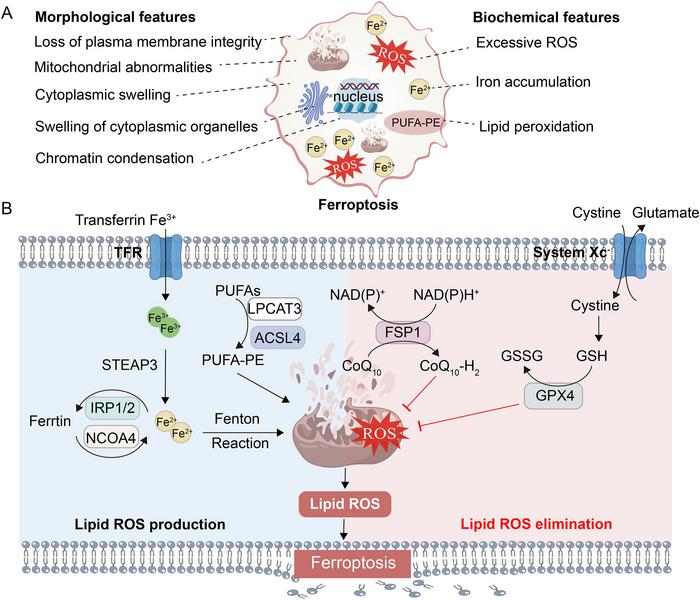
Recent advancements in biomedical research have brought to light the critical role of ferroptosis, a unique form of regulated cell death characterized by iron-dependent lipid peroxidation. The growing understanding of ferroptosis has implications for various diseases, including cancer, neurodegenerative disorders, and organ injuries. This innovative area of study is not only paving the way for new therapeutic strategies but is also shedding light on the interplay between traditional medicinal practices and modern scientific approaches.
Ferroptosis is distinct from other forms of cell death such as apoptosis and necrosis in its biochemical and morphological characteristics. The phenomenon is primarily driven by the accumulation of lipid peroxides, which is intricately linked to cellular iron metabolism. Unlike apoptosis, which is typically a well-regulated and orderly process, ferroptosis is associated with oxidative stress and is triggered under conditions that disrupt the balance of iron and reactive oxygen species within the cell. This mechanism raises intriguing questions about its potential for therapeutic exploitation.
Traditional Chinese Medicine (TCM), with its rich repository of natural compounds, appears to have a unique contribution to the modulation of ferroptosis. Certain bioactive agents found in TCM have been identified as potent regulators of the pathways associated with ferroptosis. Given the complexity and versatility of TCM formulations, the therapeutic possibilities for integrating these ancient practices with contemporary biomedical science offer a paradigm shift in how we approach treatment for a variety of diseases.
Current research highlights how specific TCM compounds can either induce or inhibit ferroptosis, thereby providing a dual therapeutic strategy. On the one hand, the ability to induce ferroptosis in cancerous cells opens avenues for novel treatments aimed at suppressing tumor growth. On the other hand, TCM can also protect healthy cells from the damaging effects of oxidative stress, especially critical in cases like neurodegenerative diseases where preserving neuronal integrity is paramount.
One of the primary pathways involved in the regulation of ferroptosis revolves around glutathione metabolism, iron homeostasis, and lipid peroxidation. Various studies have shown that TCM compounds such as flavonoids, polyphenols, and alkaloids can fine-tune these biological processes effectively. For instance, the modulation of glutathione levels can determine a cell’s susceptibility to ferroptosis, making it crucial in both cancer treatment and neuroprotection.
Research has demonstrated that harnessing the therapeutic potential of TCM may lead to groundbreaking advances in precision medicine. By customizing treatments that resonate with the body’s natural mechanisms, healthcare providers could significantly improve patient outcomes while minimizing adverse effects. Moreover, TCM’s holistic approach to health aligns seamlessly with the principles of modern therapeutic innovation, creating a synergistic relationship.
Recent findings regarding the efficacy of TCM in targeting ferroptosis couldn’t come at a more crucial time. As we face an increasing burden of chronic diseases, the integration of traditional herbal wisdom with cutting-edge biomedical practices becomes more appealing. This fusion not only enhances the therapeutic arsenal available to clinicians but also presents a more sustainable approach to healthcare.
The potential applications of ferroptosis modulation extend beyond cancer therapies. Emerging evidence suggests that it plays a vital role in the management of cardiovascular diseases and organ injuries. For instance, substances that can mitigate oxidative stress and support cellular repair mechanisms are garnering renewed interest for their ability to modify ferroptotic pathways favorably.
The intricate regulatory networks involved in ferroptosis also open new avenues for drug discovery. Understanding how different compounds modulate this process can facilitate the identification of novel therapeutic targets. By exploring the molecular basis of ferroptosis, researchers can develop pharmacological interventions that specifically target its regulatory pathways, leading to more effective treatments.
As we delve deeper into the molecular biology underlying ferroptosis, the interplay of these cellular processes with traditional treatments could redefine clinical practices. The potential of utilizing TCM not just as a complementary therapy but as a cornerstone of modern treatment approaches warrants further investigation. This truly interdisciplinary focus might yield breakthroughs in how we understand and treat not only cancer but also other chronic diseases that afflict humanity.
The future seems bright for the exploration of ferroptosis, especially as technological advancements in research methodologies continue to evolve. Increased collaboration between traditional medicine practitioners and biomedical researchers could accelerate discoveries and the translation of these findings into practice. The dialogue between ancient practices and modern science serves as a reminder that wisdom from the past can inform the future of healthcare.
In conclusion, the intricate relationship between ferroptosis and traditional Chinese medicine may provide key insights into developing innovative therapies for persistent health challenges. As we continue to unravel these complex mechanisms, the integration of diverse medical paradigms holds immense promise for improving patient care today and in the future. The ongoing research stands to redefine therapeutic approaches, making TCM a valuable ally in the quest for modern medical solutions.
Subject of Research: Modulation of Ferroptosis by Traditional Chinese Medicine
Article Title: Insights into Ferroptosis: The Role of Traditional Chinese Medicine in Modern Therapeutics
News Publication Date: October 2023
Web References:
References: Shuai Liu, Xianzhen Yang, Sanxia Zheng, Changjing Chen, Lei Qi, Xiangdong Xu, Denglu Zhang, Research progress on the use of traditional Chinese medicine to treat diseases by regulating ferroptosis, Genes & Diseases, Volume 12, Issue 3, 2025, 101451
Image Credits: Genes & Diseases
Keywords: ferroptosis, Traditional Chinese Medicine, cancer therapy, oxidative stress, precision medicine, glutathione metabolism, biomedical research, therapeutic strategies, cardiovascular diseases, neurodegenerative disorders.
Tags: advancements in biomedical research and TCMbioactive compounds in TCMcancer therapy and ferroptosisferroptosis regulation in disease treatmentintegrating TCM with modern scienceiron metabolism in cell deathlipid peroxidation and healthnatural remedies for disease treatmentneurodegenerative diseases and cell deathoxidative stress in medical researchtherapeutic strategies from traditional medicineTraditional Chinese Medicine applications





